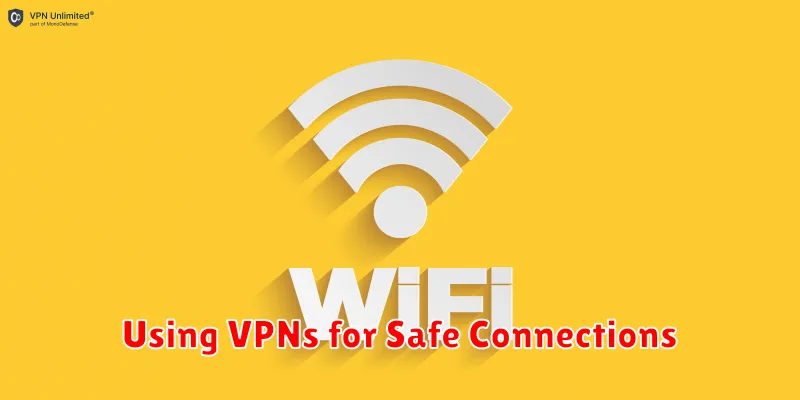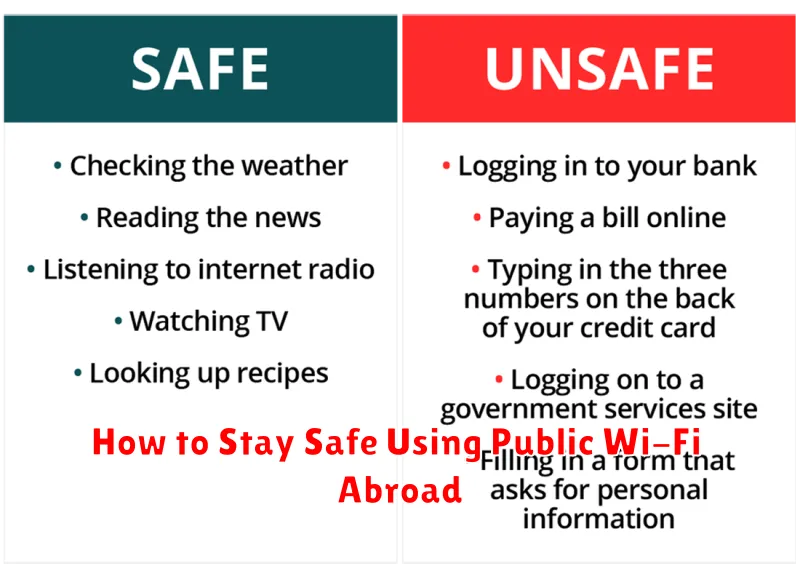Traveling abroad opens up a world of exciting experiences, but it’s crucial to prioritize your online safety, especially when using public Wi-Fi. Public Wi-Fi networks, while convenient, often lack robust security measures, making you vulnerable to cyber threats. Understanding the risks of public Wi-Fi abroad and implementing practical safety strategies will protect your personal information and ensure a worry-free trip. This article provides essential tips on how to stay safe using public Wi-Fi while traveling internationally, covering topics like using a VPN, recognizing secure networks, and avoiding sensitive transactions.
From bustling cafes in Paris to remote beaches in Bali, access to the internet has become an integral part of the travel experience. However, relying on public Wi-Fi hotspots can expose your data to hackers and other malicious actors. Learn how to navigate the digital landscape safely with our comprehensive guide on safe public Wi-Fi practices. We will delve into the importance of using a virtual private network (VPN), identifying safe Wi-Fi connections, being cautious about the websites you visit, and understanding the dangers of unsecured Wi-Fi networks while you’re globetrotting.
Risks of Unsecured Wi-Fi Connections
Using unsecured Wi-Fi networks, especially in public places, poses significant risks to your online security. Data breaches are a major concern. Without encryption, your sensitive information like passwords, credit card details, and personal messages can be easily intercepted by cybercriminals.
Malware infections are another potential danger. Hackers can exploit vulnerabilities in unsecured networks to distribute malware to connected devices. This can lead to data theft, system damage, and identity theft.
Man-in-the-middle (MITM) attacks are also a possibility. In a MITM attack, a hacker intercepts communication between you and a website, potentially stealing your login credentials or manipulating the data you send and receive.
What Hackers Can Steal from You
Using public Wi-Fi, especially while abroad, can expose you to various security risks. Hackers can potentially intercept your data and steal sensitive information.
This includes passwords to your email, social media, and even financial accounts. They can also gain access to personal data like your name, address, and date of birth. Furthermore, hackers can capture your browsing history, giving them insights into your online activities and preferences.
Financial information such as credit card numbers and banking details is a prime target for hackers on unsecured networks. Loss of such information can lead to identity theft and financial fraud.
Using VPNs for Safe Connections

Virtual Private Networks (VPNs) are crucial for securing your connection on public Wi-Fi. A VPN encrypts your internet traffic, shielding your data from potential eavesdroppers. This is especially important when using unsecured or unknown Wi-Fi networks commonly found in public places abroad.
By routing your connection through a secure server, a VPN masks your IP address. This hides your real location and makes it significantly harder for hackers or malicious actors to track your online activity or steal your personal information.
Avoiding Sensitive Transactions in Public
When connected to public Wi-Fi, exercise extreme caution with sensitive transactions. Avoid accessing or entering information related to online banking, online shopping that involves credit card details, or any other activity that transmits personal data like social security numbers or medical records.
Public Wi-Fi networks often lack robust security measures, making your data vulnerable to interception. Consider postponing these activities until you have access to a secure and trusted network.
Recognizing Fake Wi-Fi Networks
When traveling abroad, exercising caution with public Wi-Fi is crucial. Fake Wi-Fi networks, often mimicking legitimate ones, are a common tactic used by hackers. Look for subtle discrepancies in the network name. For example, “Starbucks_Free_WiFi” might be the real network, while “StarbucksFreeWiFi” could be a malicious imposter.
Another important factor to consider is the absence of network security. While not all legitimate networks are password protected, a complete lack of security on a network claiming to belong to a business should raise a red flag. Exercise extreme caution before connecting to such networks.
Disabling Auto-Connect Features
One of the most important steps to enhance your security on public Wi-Fi is disabling your device’s auto-connect functionality. This feature, while convenient, can automatically connect your device to unknown and potentially dangerous networks without your explicit consent.
By disabling auto-connect for both Wi-Fi and Bluetooth, you gain control over which networks your device joins, mitigating the risk of connecting to malicious hotspots designed to steal your data.
Installing Antivirus and Firewalls
Antivirus and firewall software are crucial for protecting your devices on public Wi-Fi. Ensure your chosen antivirus program is up-to-date and actively scanning for threats. A firewall acts as a barrier, inspecting incoming and outgoing network traffic, blocking potentially harmful connections.
Install reputable security software before traveling. This ensures immediate protection upon connecting to foreign networks. Familiarize yourself with the software’s settings and ensure real-time protection is enabled.

